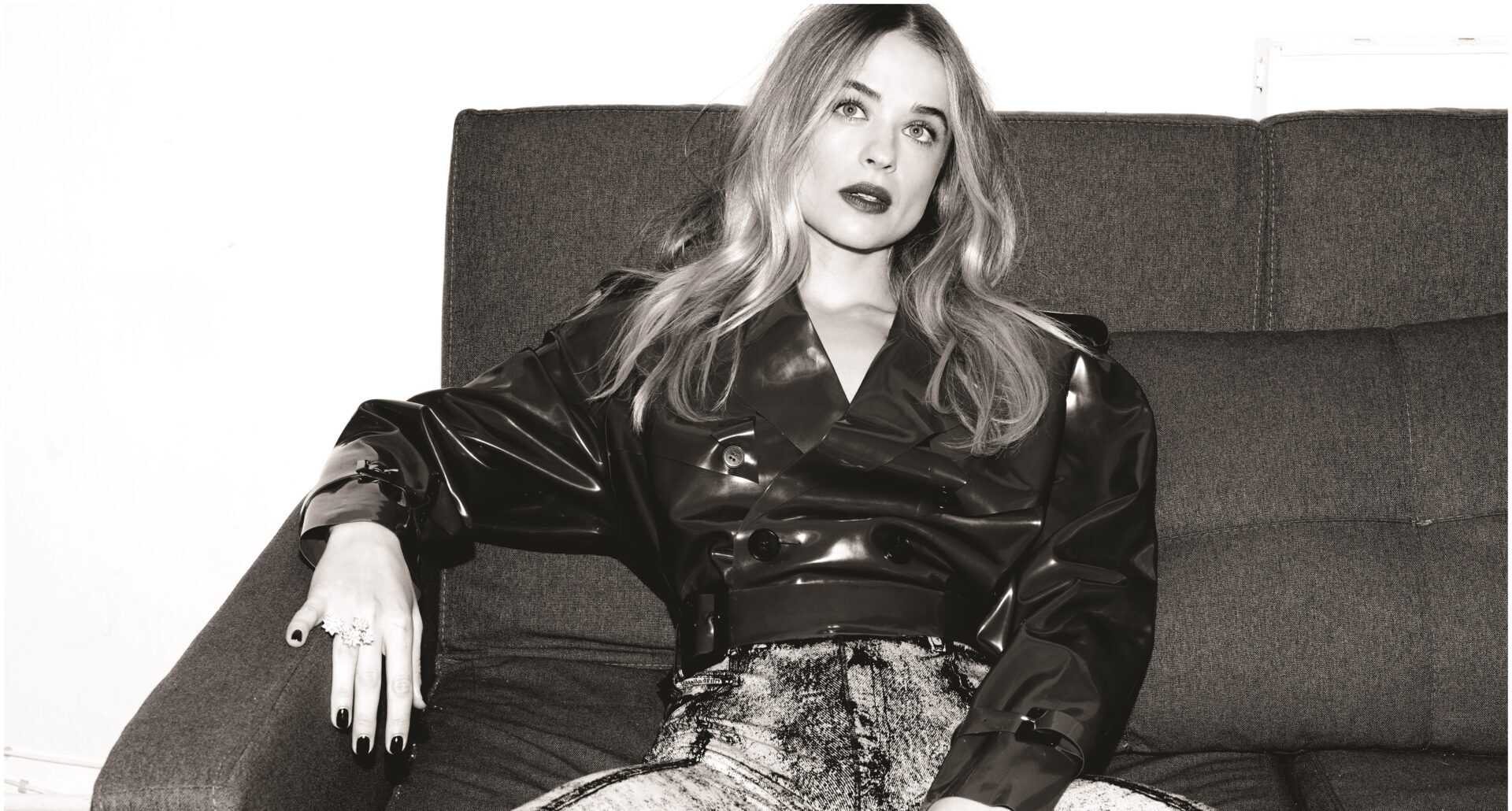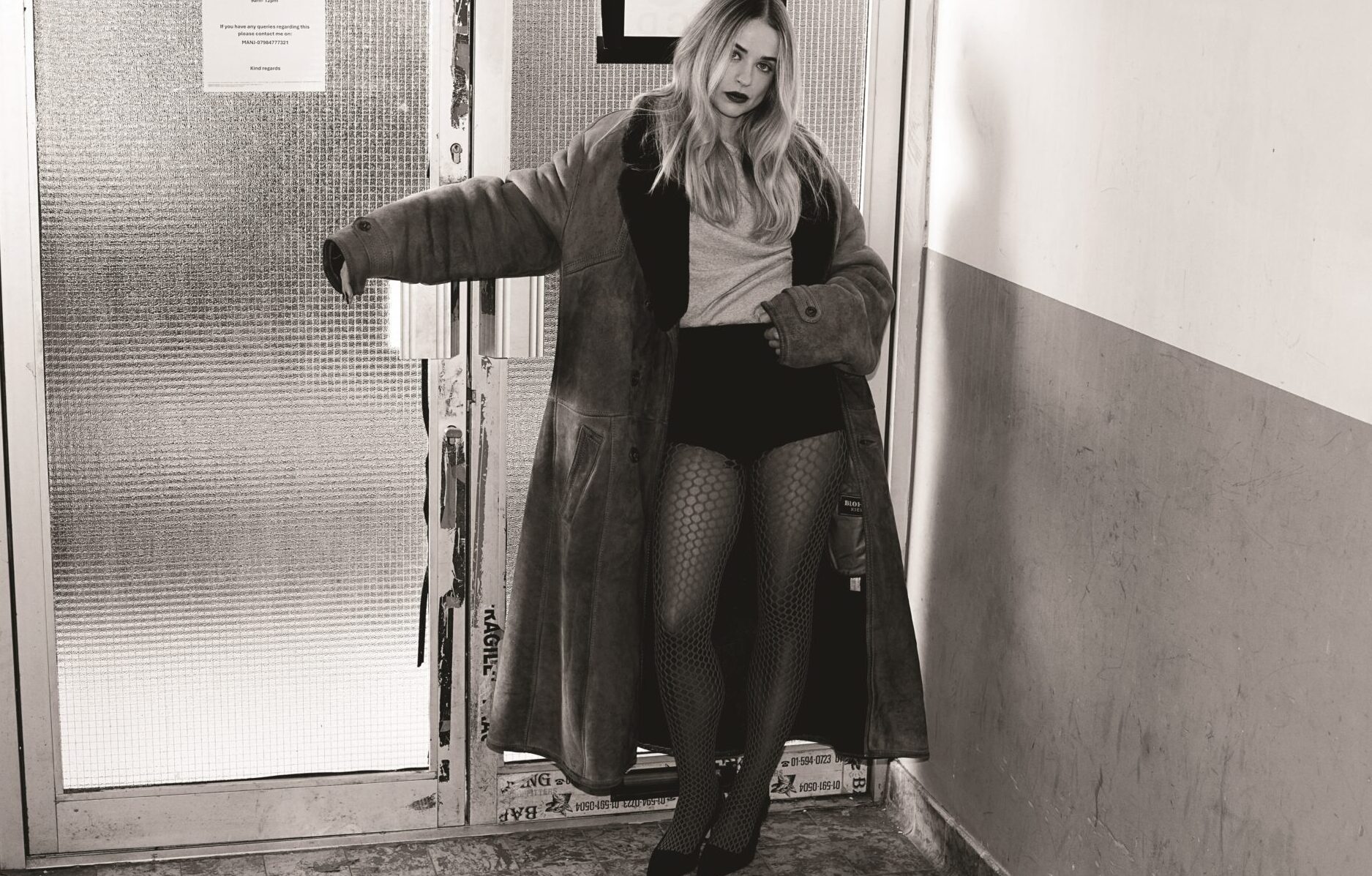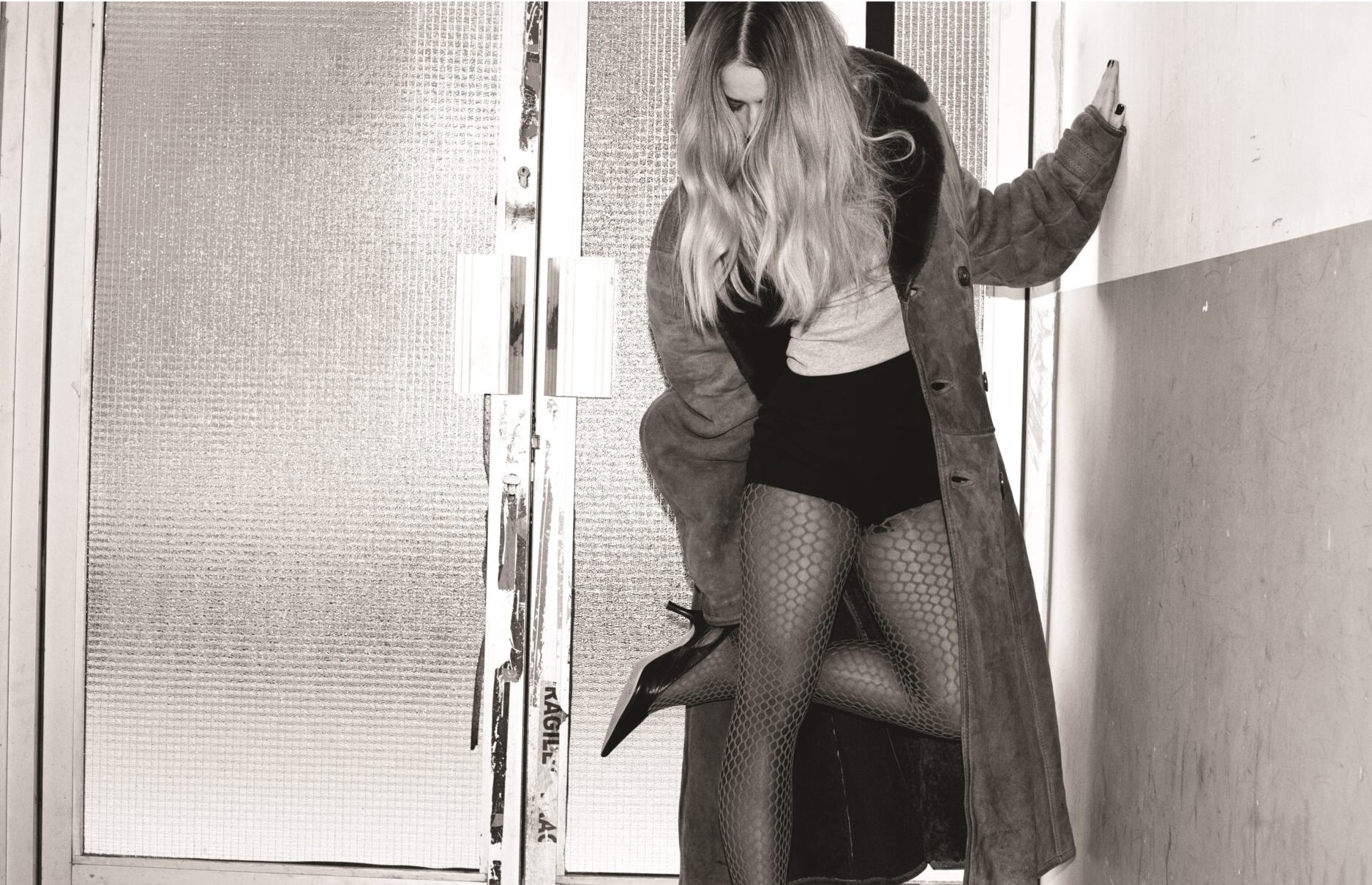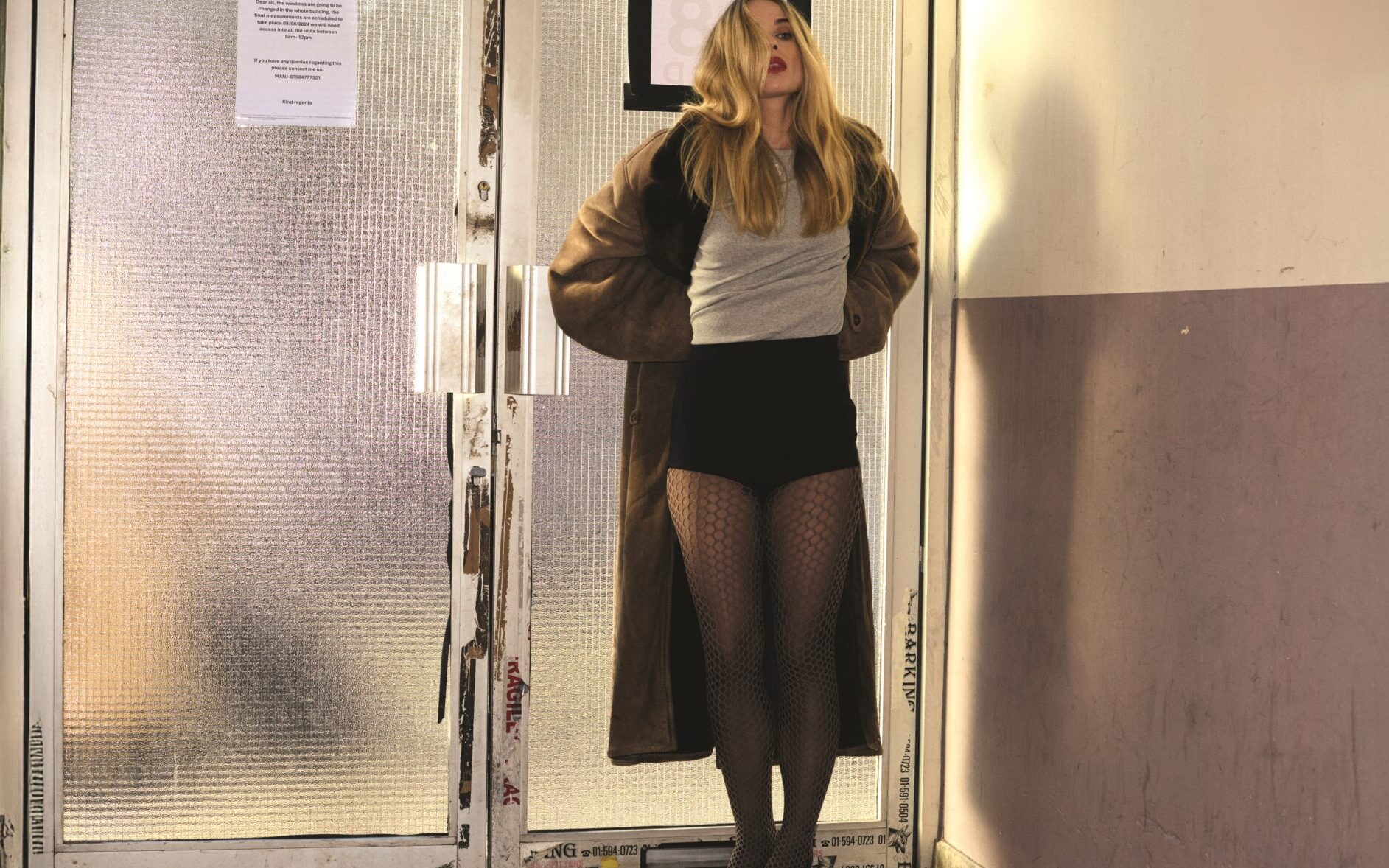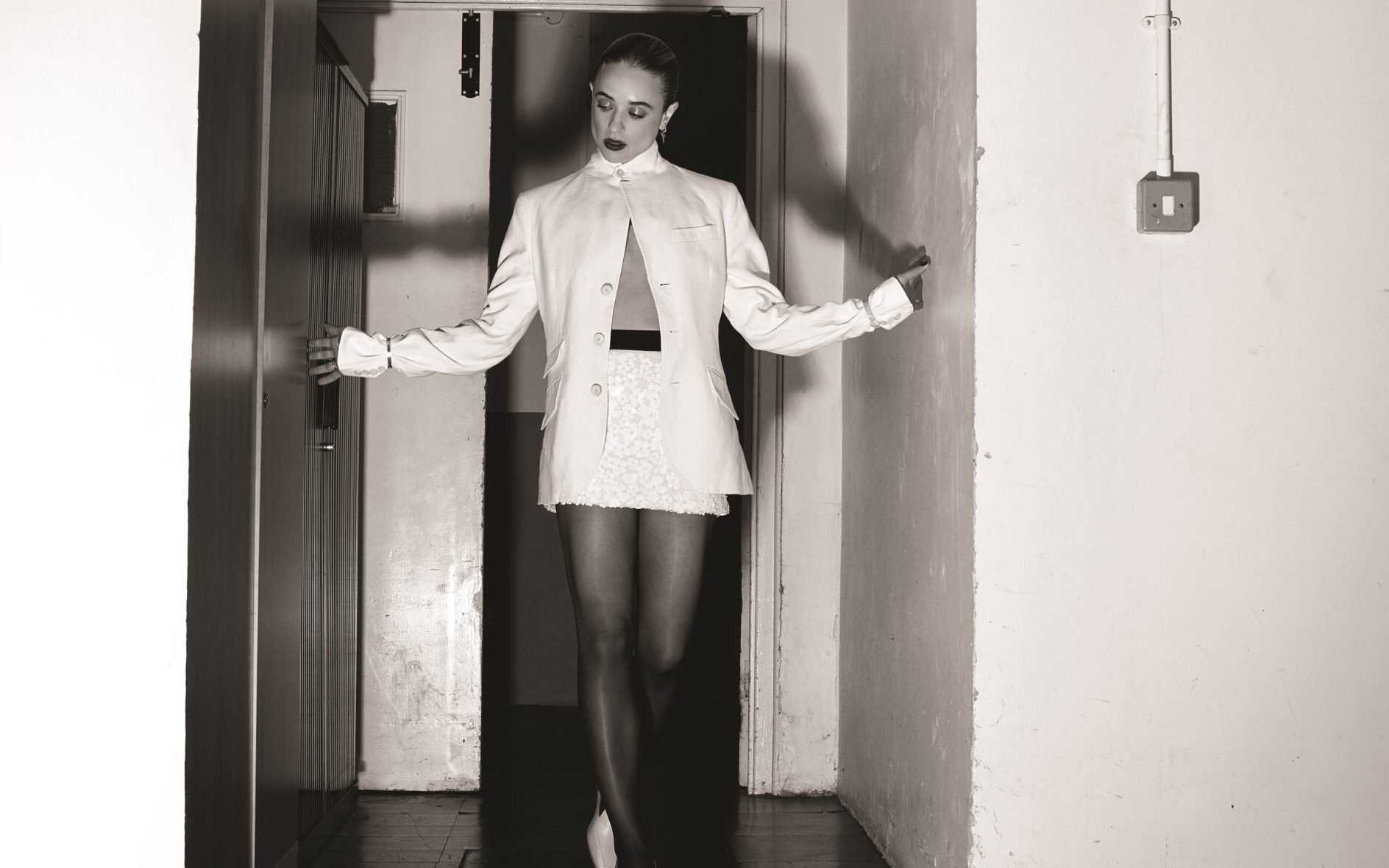Raechelle Banno is making her mark in the big leagues
WRITER: Chris Saunders
It’s a little past 10 a.m. on an uncharacteristically bright winter morning in London when Australian actor Raechelle Banno joins her Better Man co-star Jonno Davies for a virtual catch-up over Zoom. They’re both living in the big smoke and, with a laugh, they muse that they could have just strolled over to each other’s homes instead – such is the convenience of their close proximity in the city. But their closeness isn’t just geographic; after spending the better part of three years together on set, their bond runs deep, a testament to the time, trust, and shared experiences that have defined their journey.
In Better Man, Banno steps into the role of Nicole Appleton, the All Saints singer whose late-’90s relationship with Robbie Williams became tabloid gold. But beyond the glossy paparazzi shots and chart-topping success, Appleton’s story carried a rawness that the film doesn’t shy away from. Banno had to navigate some of the most emotionally charged moments of the script – including Appleton’s abortion and the heartbreak that followed. It’s heavy material, demanding a performance that balances fragility with quiet resilience, and Banno delivers. Her portrayal cuts through the film’s fever-dream spectacle with a grounded intensity, offering a counterpoint to Williams’ spiraling highs and lows.
For Banno, this role feels like a turning point. After cutting her teeth on Home and Away – Australia’s unofficial acting bootcamp – she’s spent the last few years shape-shifting across genres, from the gothic melodrama of Ruby to stepping behind the camera with her twin sister, Karina. But Better Man is something else entirely: a sharp-elbowed leap into the global spotlight, a chance to prove she’s got the weight to appear in a story that’s as raw as it is larger-than-life.
Jonno Davies had one of the most unusual tasks in Better Man – playing Robbie Williams without ever actually appearing on screen. Instead, he spent the entire shoot in a motion-capture suit, his every movement and expression translated into the film’s surreal CGI monkey version of the pop star. It’s an acting challenge that could have easily felt artificial, but Davies captures Williams’ signature swagger, manic highs, and crushing lows with uncanny accuracy. More impressively, he builds a believable relationship with Banno’s Nicole Appleton, proving that chemistry isn’t just about what’s seen – it’s about what’s felt.
Now, with the dust settled and Better Man out in the world, the duo have had time to reflect on the whirlwind of bringing the film to life. Here, they look back on the madness of motion capture, the emotional weight of their roles, and the moments that stayed with them long after the cameras stopped rolling.
Jonno Davies : So, Raechelle, it’s good to see you again! We want to get all access to your creative mind and your journey throughout Better Man. So, how are you feeling? We’re out in the cinema right now. The film has had lovely reviews. What’s it like to now come out the other end of this whole process?
Raechelle Banno: It’s really surreal. When I came back from Australia after filming, it was hard to explain to people the experience because it felt like this dream I’d had – this wonderful, creative experience working with people I never thought I would be able to connect and collaborate with And then all of a sudden, it was just… waiting. I’ve never done a film before. Most things that I’ve done were out in the next six-ish months, and this was not the case.
Jonno: I forgot, this is your first film isn’t it? What a first film to do!
Raechelle: Yeah, I know I’ve been spoiled rotten! When I was on set, I knew films aren’t always like this. And the fact that the people watching it are enjoying it – we know that doesn’t always happen. So to be able to tick all those boxes… I’m just really proud, and even that feels like such a small word for the way I feel. People can see and feel the heart and soul that went into it. I’ve never had something that I have so enthusiastically encouraged people to go and watch because I’m like, “It’s a really good time! You really should go.”
Jonno: That was the same as me. It’s not so rare, but there are often times when we do stuff and maybe we’re not proud of what we’ve done ourselves. It made this whole experience so much nicer to celebrate with your loved ones when you’re really proud of it.
Raechelle: Yeah. “Celebrate” is the right word. I think it does feel like a celebration. Every time I watch it, or every time someone tells me they’ve watched it, I’m just like, “Oh, wasn’t it great?” It is just a celebration.
Jonno: And also, I know your mom is a massive Robbie fan and gave you the culture trip of Robbie growing up, for you and your sisters. That’s another avenue for you to celebrate with them and make it a really personal experience as well.
Raechelle: Yeah, it’s an odd full-circle moment. I’ve had a few of those. When I was auditioning, just the fact of having any sort of closeness to this project felt like a full-circle moment for my family. We really cared about this story, and when I got it and got to film it, at the first table read, I think I was probably a good barometer for Michael in terms of audience because I just cried the whole way through. And then again, to sit in the audience at the London premiere, to share it and hold hands with my family while this was on… it really meant something.
Jonno: There was another moment you had with your family on this film, which was when you were in Melbourne, and your mom said something. Can you tell the world what happened there?
Raechelle: So I’d just been given the role, and we heard that Robbie was gonna be performing in Melbourne, and that was my birthday weekend. We just bought tickets because we would’ve bought tickets regardless. We had seats in the nosebleeds. The funny thing is, I first heard ‘She’s the One’ on the Knebworth DVD. I don’t remember it being the big song that it is. I thought it was just something that only my family knew. He started it, and the whole audience erupted – phone lights went up, and everyone was singing. I burst into tears. And my mom was pointing, going, “She’s the one! She’s the one!”
Jonno: True mum fashion. And of course, ‘She’s the One’ – I should point out to everyone – in the film is a very special song for you and your character, Nicole, because it accompanies this spectacle, this time-jumping dance segment that is just so poignant. It touches on very emotional, personal matters for the two of them but also really shows off not only Michael’s ability as a director but also your ability as a dancer.
Raechelle: Yeah. I really loved the scene prior. That was one of my audition scenes, and I had no idea where it went. It was only when I met Simon Gleason in my callback that he said, “Oh, this goes into ‘She’s the One,’” and I thought, “Oh my gosh, that’s perfect. How beautiful.” I love scenes that have action – where you learn about people and you really gain character and story through movement. I think Michael has such a skill to do that through dance as well. Everything has to mean something. I was really excited to see that vision come to life. I got to meet Ashley Rollin after I’d been asked if I could dance. I went into his studio in London, and he ran through a couple of moves with me. I didn’t realize, but they wanted to test if I was telling the truth. He stopped me after a while and went, “Oh, so you’ve danced?” I was like, “Yeah, I’ve danced.” We learned the opening sequence, which ended up being slightly different choreography, but we learned quite quickly. I feel like I picked up the choreography pretty quickly. It was strange to hear this new version of ‘She’s the One’ – hearing Rob’s voice but knowing that I was the one he was singing about at that moment. I had to lean against a wall on the way out and just be like, “This is a lot.”
Jonno: That choreography wasn’t just difficult in itself – you also had to match what it bleeds into, because the dance cuts in with scene segments, right? So you really had to be definitive and detailed with your arm and hand placement.
Raechelle: Exactly. Everything – eye line, positioning – it was like we were filming a short film within the film. You and I had already filmed those in-between scenes, we had our story and the arc of the relationship mapped out, and then it was just a matter of trying to match that energy. It was beautiful in the sense that both the scene before ‘She’s the One’ and the dance itself are the first time Rob and Nicole meet. They’re just falling for each other – it’s pure love and joy.
Jonno: And like I said, the dance intercuts with scene work, and we see Rob and Nicole’s journey unfold. The audience almost sees their timeline before they do. In those moments, the film touches on some really sensitive, emotional subjects, which is even more impactful knowing that this is a true story. One of the big ones is that Rob and Nicole go through an abortion, which is a sensitive, and in some places, taboo subject. What was that like for you? Did you feel a responsibility, a pressure? Were you worried about delving into that world?
Raechelle: I wasn’t worried, because I think the only way we take away the taboo around these topics is to acknowledge them – to face them and talk about not just the act itself, but also the consequences. Especially when the decision comes from someone having their choice taken away, or being presented with an ultimatum that isn’t in their best interest. I was really proud that Simon, Michael, and Oliver wanted to tell this story truthfully, and that they wanted to do it with Nicole’s consent. I know Rob was emphatic about that – he didn’t want to tell this story without her. Props to him for that, and props to them for wanting to be honest. This happened a lifetime ago, but it’s still worth discussing and exploring. The pressure I felt was making sure I was as emotionally educated on the subject as possible. I read Together, the book Nicole wrote with her sister Natalie, where she details the experience – not just how she felt when she learned she was pregnant, but also how the pregnancy and the possibility of it affected their relationship. There was a lot of hope in that moment, which makes the downfall, when it’s all taken away from them, even more heartbreaking. It wasn’t about replicating Nicole – she has her book, and if people want to hear from her, she’s here to tell her story. My job was to find the truth in the moment, within our version of the story. You were such a gift in that – you really met me on that level, and we were on the same page with all of it. Then, it was about finding the truth with the people on set.
Jonno: I love what you said about it not being about replicating Nicole. This was also your first time playing a real person, so was your prep different?
Raechelle: Slightly, yes, because this time I had facts to work from. Usually, a big part of my process is building the inner world of the character—how they hold themselves, how they see the world. This time, I had nineties interviews and documentaries to watch, plus Nicole’s book, which gave me her inner monologue. I could see her experience from the outside, but also build an inner world that would ring true for our version of the story. There were also these really beautiful videos I found of her with Liam and with Rob over the years, showing how she carried herself and how she looked at people. That helped me bring something truthful to my performance. My process was more about settling into the energy of the scene. Most of my work was with you, so it was about feeling connected to the space and the people I was working with. That helped me feel safe enough to play. There were a couple of scenes where I had to be really emotional, and I remember asking you for a hug before one of them!
Jonno: I remember that!
Raechelle: And then the take ended up being ruined anyway! But yeah, I like to feel connected physically or energetically before a scene.
Jonno: The word “collaboration” gets thrown around a lot, but I think it really meant something on this project. There was one scene between us – one of our big emotional moments – where something just felt off. We couldn’t quite click into it. And then we went home that night thinking it was our fault. I even messaged you saying, “I’m so sorry, I was crap.”
Raechelle: And I sobbed myself to sleep!
Jonno: I had a message from Simon, our writer, saying, “We failed you with this scene.” Eric’s going, “What am I doing wrong with the camera?” And I love that everyone had a responsibility. It wasn’t a pressure where we thought, “Oh, we’re gonna lose our jobs” or “We’re ruining everything.” It was more like, “I need to step up. I need to really commit myself to this.” Everyone registered that. The next day, we came in fresh, put the previous day behind us, and just played. That’s my favorite ethos, my favorite kind of environment – that shared ownership.
Raechelle: No one was just clocking in on this job. You can see in every frame of this film the care that went into it, which makes watching it so exhilarating. That comes from the top. No one can have a conversation with Michael Gracie and not walk away feeling passion and excitement. You just really want to deliver for him, and that energy rippled through the entire crew. It made the set a great experience, but I think it also shows in the final product – there’s heart in every aspect of it.
Jonno: Moving onto being an actor more generally, what’s the hardest thing about being in this industry for you?
Raechelle: Finding your community is hard. When you have it, it’s amazing, but this can be a really isolating industry. Whether you’re a writer or an actor, a lot of your work is done alone until you’re finally on set or in prep. I was fortunate. No one in my family was in the industry before Karina and I, but we decided at the same time that we wanted to be actors. Even though we didn’t understand the industry, we had each other. We could bounce ideas off each other, mess around, and dream together. It was such a gift.
Jonno: Speaking of gifts, let’s go back to Better Man, because it was one. We were privileged – like you said, it set the bar. What was it like working with someone in motion capture? I was there in my gray pajamas, covered in dots, with a boom camera in my face. That must’ve been a strange thing to process.
Raechelle: Aside from the danger of that boom camera – because I bashed my head a couple of times – honestly, it didn’t take anything away. When I watch the scene where I hug you and whisper in your ear, I always think about how, on that day, your hug cut me right here. That’s what I remember when I see that moment! People ask me a lot if it was weird, but the truth is, this job gave us a gift. We weren’t imagining some big scary dragon burning down a town. Everything, even though heightened, was still grounded. And yes, our lead is portrayed as a monkey, but at its core, it was just about you and me. Something beautiful about Rob and Nicole’s relationship is that their careers and the superficial parts of their world fall away when it’s just them. And I think that’s what happened with us too. We were on this massive set, in Australia, and you were going to be a monkey – but when the cameras rolled, it was just about us.
Jonno: Yeah, I get asked about that a lot, and I do think our rehearsal process really helped. We got to understand each other’s rhythms and connections. The motion capture was just another layer added to the experience. I remember you said something to me when we were on set, where you often didn’t watch the monitor right after a scene. A lot of us did, especially in the “we want to be narcissistic” way. But also, I was like, “I want to see myself on screen now because I won’t see it in the film because I’ll be a monkey.” So I needed to see. But I remember asking if there was a particular reason why you didn’t, and you said it was something you’d learned over time – that as long as it feels good in the moment, that trumps how it looks. And I took that on board. I’ve used that in audition tapes. Now I rarely look at my audition scenes. Was there a specific moment in your career where you realized that? Did it build over time?
Raechelle: Yeah, I think it did come from when I was on Home and Away, which was very early in my full-time acting career. There’s this great thing about being on there – you spend your first six months not being on air, so you live in this blissful world of just being an actor. The outcome is not a part of your experience. Right before I went on air, I had to go in and do some ADR (Automated Dialogue Replacement). You go into a booth, and you have a screen to match your vocal performance. It was the first time I’d seen myself on screen as Olivia, my character, and I was doing some voice recording for a scene that was quite a big moment. It was fairly emotional. We spend so much time preparing and living in the world and minds of these characters – sometimes you spend two hours filming something, sometimes two days. I was really upset by the fact that the scene felt enormous, but when it got cut down, it was just a two-minute scene. I felt like I lost something, and it didn’t mean anything anymore. But then someone really wise said to me, “It’s not about how you feel; it’s about how the audience feels.” And so I realized over time on the show that the only thing I can control is what I do on set. Unless it’s technical, like “Your hand’s here, but it needs to be there,” I don’t need to see the monitor. I trust the people I’m working with. If I’m doing something wrong, they’ll tell me. Once I walk off set and that scene is wrapped, it’s not my business anymore. I don’t have any control, and then it’s really about handing it over to the audience.
Jonno: Very wise words, thanks so much for that Raechelle. I’m sure we’ll see each other again very soon!
PHOTOGRAPHER Roger Rich
VIDEO FREDDIE ALEXANDER-MORRIS
MAKE-UP ARTIST TALIA SPARROW
HAIR STYLIST Ross Kwan
STYLIST & FASHION EDITOR Justin Hamilton
STYLIST ASSISTANT Lorna Lane
STYLING ASSISTANT Anairin Kaines
